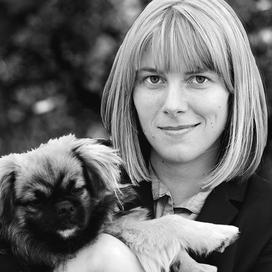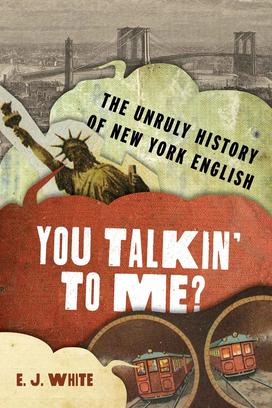Elyse Graham ’07 tells the history of New York City’s accent

The once-naif is now an expert on that accent — more popularly known as “Brooklynese” — and on the broader history of language in New York City. Graham teaches a popular course on the subject at Stony Brook University and has also written a new book, You Talkin’ To Me? — The Unruly History of New York English (published under her pen name, E.J. White).
For decades, “Noo Yawk” accents have been represented in movies and cartoons, (Bugs Bunny has a New York accent) by gangsters and hustler types. Yet, it was once the speech of the upper class. In recordings of Theodore Roosevelt, one can hear the famous “Old New York upgliding diphthong,” as Graham puts it, when he says sounds like “boined” for “burned.”
One reason the accent went from connoting upper-class to lower-class? Its stigmatization after huge numbers of immigrants from Southern and Eastern Europe began to arrive in New York City. That precipitated a turn among elite institutions (including Ivy League admissions offices) away from New England and toward the West and Midwest, where Protestants of Western European descent were more likely to live, Graham explains.
“I read one memoir by an alumnus who attended Princeton during the 1930s, [who] wrote about having to get rid of his Midwestern accent to fit it in at Princeton,” Graham says. “Today it’s the opposite — you would get rid of your New York accent to show you were educated.” She points out that America is one of the only nations whose national speech standard comes not from its capital of finance and culture, as in England or France, but from other parts of the country (the West and Midwest).
In other chapters, Graham describes how the slang of New York City was transmitted across the country through crime novels (which reflected the profound changes brought by urbanization from 1850 to 1950 and carried instructive warnings about con men and grifters), and continues to be transmitted through hip-hop (arguably the art form with the greatest influence on language today).

The New York accent is fading more slowly than expected. Some researchers attribute this to a desire to assert one’s identity as a local, in a gentrifying city that has seen a huge influx of outsiders since the 1980s. Even young people aware of its stigmatization, and easily able to “code switch” between more and less prestigious accents, continue to hang on to the New York sound. Native New Yorkers have transfused the stigma with what sociolinguist Kara Becker calls “covert prestige,” according to Graham. “I’m from New York; can’t you hear it?” Graham writes. “It’s a lot of weight for a little sound to carry.”











2 Responses
Len Green
8 Months AgoAccents and Individualism
Speaking of the midwestern influence, what about the “ya” for “you” in Chicago? I am originally from Jersey, raised in Brooklyn, and feel the homogenization of speech is indicative of the ongoing decline of individualism in America ... speaking for myself.
Robert E. (Bob) Buntrock *67
5 Years AgoNew Yawk Accents
You Talkin’ to Me? looks like a fascinating book. My wife and I were native Midwesterners and had encountered a few NYC accents before we moved to Princeton for my graduate school. However, it was immersion language class not only for New Yawk accents but the plethora of other eastern accents. Friends and lab mates said, “Oh, you’re from way out west” (since you talk like it too). When we went back home for the first time in our second year at a party our old friends said we talked like New Yorkers. C’est la vie. After a few years I began to appreciate the wide range of accents native to a few hundred miles of Megalopolis from Boston to D.C. I’ve detected at least two varieties of NYC accents, the crisp, almost bitten-off speech of many and the mush-mouthed, incomprehensible speech of Cleveland Amory. After several years living in Allentown, Pa. (Pennsylvania Dutch), near Chicago (Da Bears), and briefly back to Minnesota (Uff da, Ya sure), I’ve been 16 years in Maine (Orono) and still learning all of the accents (wicked good, French, etc.). It’s been a lifelong education.